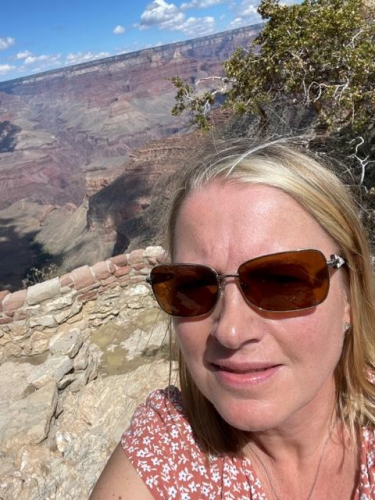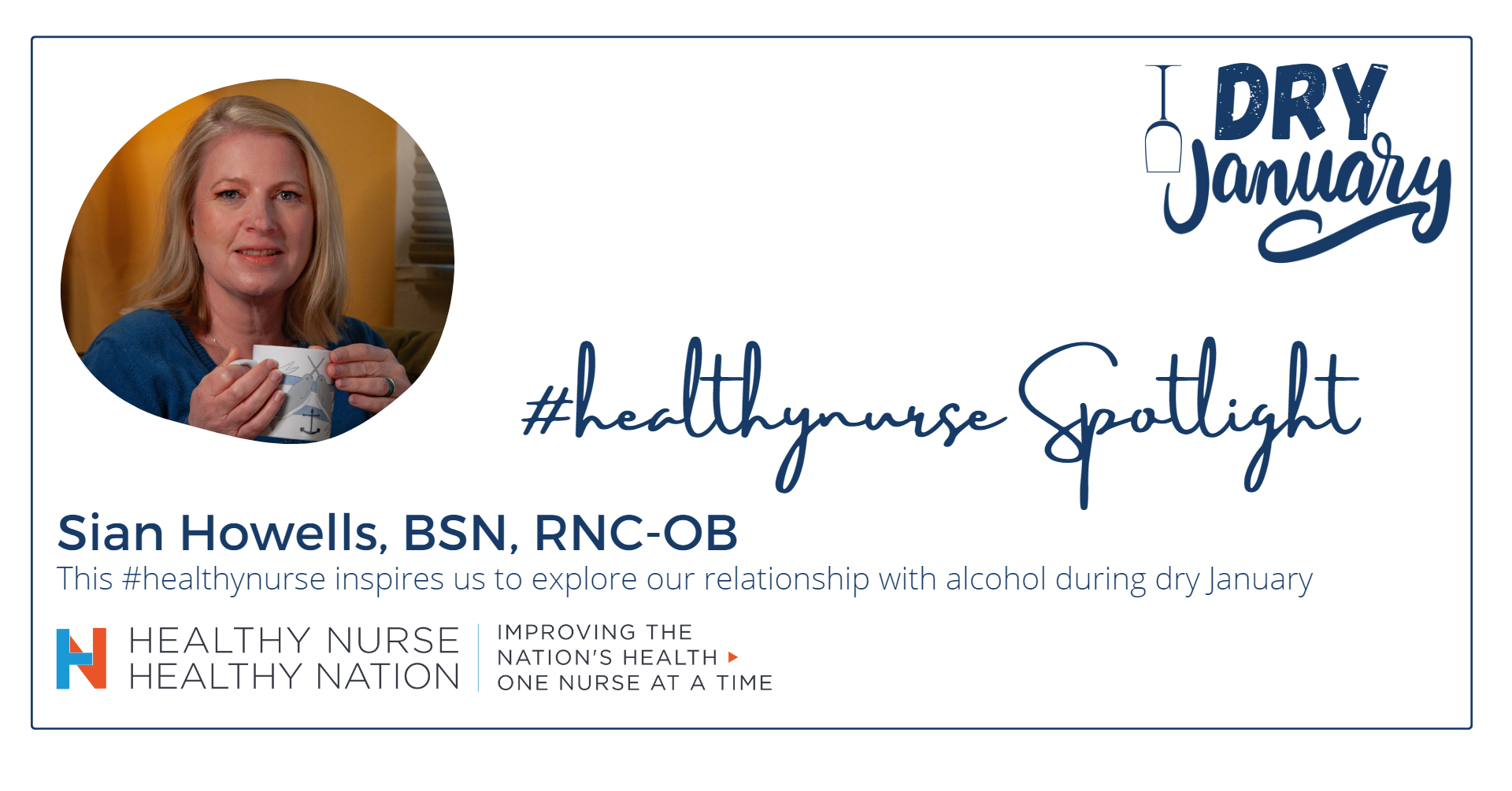Healthy Nurse, Healthy Nation™ - #healthynurse Spotlight Series - Sian Howells, BSN, RNC-OB
Published

In 2018 I did a Dry January, and it changed my relationship with alcohol forever. I had done plenty of health challenges that involved cutting back or eliminating alcohol before, but this time, the contrast between how I felt drinking and not drinking was too dramatic to be ignored.
Over the years my medical problem list had been slowly increasing. I thought that was normal for a person in their mid-forties. I had been complaining to my doctor about anxiety and insomnia. I had accepted that it was inevitable for a nurse with a demanding job, trying to balance family life.
At the time I did the Dry January I was also getting concerned about my blood pressure, had disfiguring rosacea, was over weight and had a nagging, painful Achilles tendinitis, that no amount of PT, creams or acupuncture could improve. I had also been waking in the middle of the night, heart racing and burning up, symptoms I assumed to be perimenopausal.
Within the first couple of weeks of January, I noticed a huge difference in my mood and sleep. I found that if I did wake in the night, I went back to sleep easily. The feeling of being anxious and overheated was gone. Even if I had less hours of sleep than I had hoped for, I felt refreshed in the morning and prepared to take on the day. I was calmer at work, able to roll with the changes of the day with less angst. I was more energized during my 12-hour shift, and most pleasingly, less tired and irritable with my family when I got home from work. My skin was already clearing up and I was slowly losing some weight.
I remember thinking “everything in my life is better without alcohol.” This was a new concept for me. Previously I’d always been excited to get back to my wine. I’d grown up in a family where drinking in the evening was deemed normal, so as an adult I had recreated that reality through my choice of spouse and friends. I had decades of fun experiences that centered around alcohol use. The mental conflict that my new realization created was painful. I could no longer deny that alcohol was taking from me, but I simply couldn’t imagine life without it.
So began my journey to discover why I felt compelled to do something that I knew was harming me. One thing became obvious right away. Choosing to not drink was lonely. My spouse had been happy to do the Dry January, and we had even gone a few days in to February. But he was ready to get back to his evening drinks, and wanted no part of my suggestion that we take more breaks during the year. I remember thinking, well I guess I’ll just have to wait until next year to feel this good again, and then laughing at myself for the absurdity of the thought.
I found that my friends and family didn’t want to talk about my desire to cut back on drinking. One friend blatantly told me that I was making her uncomfortable when I ordered a cider for her and a club soda for myself. I worried a lot about what people would think of me if I stopped, and that I would no longer be invited and included. When I told my dad my intention to cut back on alcohol, he laughed and said “You don’t stand a chance!”, referring to the strong drinking culture in my family. It felt like I was trying to do something that went against every message and expectation in society.
Undeterred, I kept on looking for a supportive community, and was able to find it after reading a lot of literature and watching Ted talks. I was excited that terms like “sober curious” and “grey area drinking” were starting to be used, as up until then I had only heard alcohol use defined in terms of addiction. As a nurse I was terrified that I would get labeled or misunderstood if I said I was actively looking for ways to decrease my alcohol intake. I was conditioned to think that people that stop drinking, “need to”, and that there was usually a dark, rock bottom story behind it. I worried that I would draw attention to myself, even though I had never been impaired at work, or jeopardized patient safety in any way.
I joined an online community, and through a shared mindset, I was finally able to find the confidence to say “I don’t drink” with self-conviction and pride. I had still been drinking on occasion to fit in. I challenged myself to go a whole year alcohol free in 2020, and that was the best decision I could have made. By this time, I had already seen a radical improvement in my physical and mental health, and appearance. Unknown to me, the world was about to get rocked by the pandemic, civil unrest and natural disasters. Like most people, I had used alcohol to cope with stress at times. This option was not available to me, so I leaned into coping skills I had learned from the alcohol-free community such as exercise, meditation and gratitude practices. I found a resilience I didn’t know I had.
At this point in my life, I can honestly say I love my job. I have watched wonderful nurses buckle under the pressure of the last couple of years. I believe that it was my decision to eliminate alcohol that has kept me in a strong, powerful position to get the most out of my life and career. My current medical problem list is minimal. I have less inflammation and my Achilles tendinitis is long gone. I can now hike up hills and get through a 12-hour shift without limping. I weigh what I did in my twenties. My blood pressure is perfect. Alcohol was the keystone habit that kept me stuck in unhealthy cycles and blocked me from reaching my health goals. It was also slowly but surely affecting my mood, and sucking the joy out of my life.
I want us to be able to talk about how we use alcohol in our society honestly, and without fear of judgement or labels. Research shows that people in Oregon have increased their alcohol use over the last couple of years. Healthcare providers are not immune to the pressures and are included in this statistic. I am concerned that nurses that have noticed a change in their alcohol use might be too frightened to speak up, alarmed that they will be labeled a “problem drinker.” When in fact, they have only used a socially sanctioned coping tool, that will ultimately cause all people more harm than good. I don’t want alcohol to be ignored in the conversation of nurse wellness, and strive to keep it free from stigma and labels.
Thank you for reading my #healthynurse journey.
Are you a #healthynurse? Contact us to share your stories!

Not a member of Healthy Nurse, Healthy Nation (HNHN) yet? Join today!
Join our monthly challenges at hnhn.org/challenges.
Blog #healthynurse Spotlight
10/18/2022 1:54pm CDT
The #healthynurse Spotlight is a shout out to nurses who are making changes in their lives to improve their health and wellness. You can too! Read their stories for inspiration here.



Post a Comment or Question